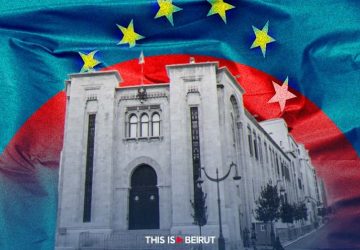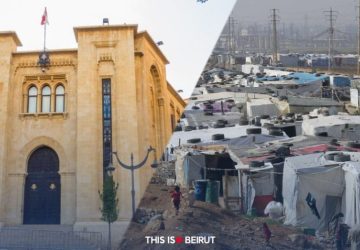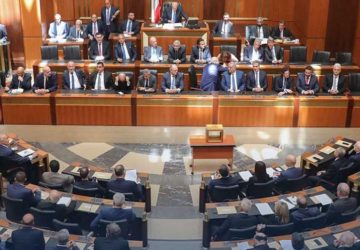Listen to the article
The legislative session scheduled for Thursday did not take place due to a lack of quorum, reflecting the depth of the political divide and the deterioration of the State. The most striking aspect of this failed day at Parliament was the absence of the Free Patriotic Movement (FPM) MPs, as the party’s leader Gebran Bassil is currently engaged in negotiations with Hezbollah.
On Thursday, Parliament witnessed yet another episode highlighting the extent of the deterioration of the State, primarily concerning the disregard of constitutional deadlines for electing a president.
Only 53 MPs participated in the legislative session convened by Parliament Speaker Nabih Berri at Place de l’Etoile. This number once again demonstrates the depth of the division between the two main political camps: the sovereignist blocs and MPs, and those of the March 8 coalition.
The session, which would have focused on the examination of four draft laws, including two related to capital control and the Sovereign Fund (where the revenues anticipated from Lebanon’s potential offshore gas and oil resources would be deposited), did not take place due to a lack of quorum.
This is because of the continuing political standoff: the last (14th) parliamentary session aimed at electing a president was held more than two months ago and was adjourned without electing a new head of State.
The sovereignist camp has refused to take part in any legislative session before a president is elected to avoid endorsing and normalizing the presidential vacancy. On the other hand, the March 8 coalition, strongly committed to the candidacy of Marada leader Sleiman Frangieh, acts as if the presidential election is not an urgent matter.
However, a new development occurred on Thursday: FPM members did not attend the session, despite their contribution to ensuring the quorum in the two previous legislative sessions that took place after the beginning of the presidential vacancy. These sessions had been boycotted by the opposition and Change MPs.
The first session, held on April 18, resulted in postponing the municipal elections. During the second session on June 19, Parliament had approved two bills proposing the establishment of credit lines to finance salary increases for civil servants, as well as bonuses and allowances for teachers at the Lebanese University.
The lack of quorum was denounced by cartaker Prime Minister Najib Mikati, who stated, “If certain draft laws, especially those regarding capital control, are not adopted, the economic situation will worsen. What could be more urgent than today’s agenda?” he asked with frustration as he left Parliament following a meeting with Nabih Berri.
53 MPs present
In practice, and considering that the quorum for a legislative session requires the presence of 65 MPs (the absolute majority of the 128 MPs who constitute the Parliament), Parliament Secretary General Adnan Daher announced at around 11:30 AM that only 53 MPs were present, concluding that the session had been postponed.
Only the Hezbollah MPs, the Amal movement, the Progressive Socialist Party and some others aligned with the March 8 coalition, along with a few independents, showed up to the session.
In fact, the lack of quorum was predicted since Wednesday evening: opposition MPs had stated their unwillingness to participate in the session and urged their colleagues to do the same. In a strongly worded statement, 31 MPs from the parliamentary blocs of the Lebanese Forces, the Kataeb party, and the Lebanese Renewal Party, along with MPs Waddah Sadek, Michel Doueihy, Mark Daou, and Bilal Hshaimi announced a plan to confront Hezbollah. One of the points they emphasized had to do with the boycotting of any legislative session convened before the election of a president due to the unconstitutionality of such a session.
The absence of the FPM
The risk of a lack of quorum became more likely on Wednesday evening when the FPM parliamentary bloc announced that it would not participate in the session, as “the agenda is not urgent in nature.” The bloc reiterated, after an extraordinary meeting, that this was the “criterion it had adopted for participating in legislative sessions in the absence of a head of State.”
Nevertheless, it emphasized the “importance of the draft bills on the agenda,” reminding that they had “actively contributed to proposing, studying and presenting these texts for the plenary session.”
According to parliamentary sources close to the opposition, the absence of the FPM MPs can be attributed to two factors. While it is true that the items on the agenda lack urgency, the Aounist bloc likely realized that participating in the meeting would come at a high cost at the public level. This is especially true after the serious incident in Kahaleh (where a shootout occurred between residents and Hezbollah members following the overturning of a truck transporting ammunition, resulting in the death of a Kahaleh resident and the truck driver) and the strong-worded statement issued by the opposition.
Furthermore, as he is engaged in negotiations and bargaining with Hezbollah over the presidential election, the FPM leader has a keen interest in demonstrating that his bloc holds substantial weight in Parliament, which allows him to become a game-changer.
However, a source close to the Aounist bloc dismisses this analysis. “This absence is solely motivated by the approach adopted by our bloc, which involves voting only on laws of extreme necessity during the presidential vacancy.” The two legislative bills in question “required consultations and a prior agreement that has not yet been reached,” according to that same source.
Sovereign Fund
In this context, several MPs stated on Thursday that the draft law regarding the Sovereign Fund required deeper examination.
Sajih Attieh, Chairman of the Public Works and Transport Committee and member of the National Moderation bloc, clarified that the participation of his bloc hinged on the withdrawal of this draft law, “as it is premature, has numerous flaws, and has not been approved by our committee and the joint committees.”
In this regard, in response to the criticisms directed at this text, which has been recently approved by a subcommittee from the parliamentary Finance and Budget Committee he presides, MP Ibrahim Kanaan reiterated that the bill was developed after studying four different legislative bills put forth by four distinct parliamentary blocs with the guidance of local and international experts. Kanaan clarified that the text was approved within the committees by MPs of different blocs.





